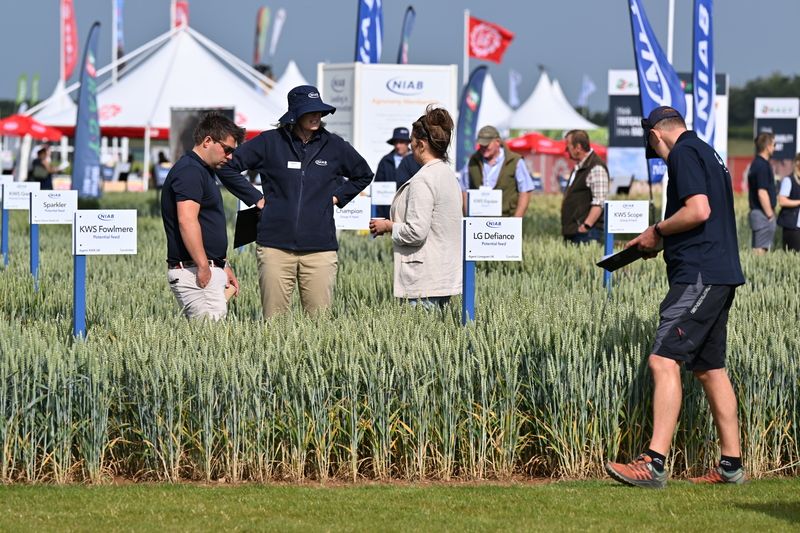Crop varieties to meet evolving challenges

Crop science is evolving all the time, with the latest arable varieties designed to meet farmers’ needs in a changing climate with ever-present disease and pest pressure.
And visitors to the Cereals Event were able to get up close to the latest wheat, barley, oilseed rape and alternative crops to reach the market. With more than 600 varieties grown on the site from 25 leading exhibitors, there was plenty to talk about for every farm situation.
Reflecting the drive to reduce artificial crop inputs and the need for resilient varieties, Senova’s offering included three newly recommended winter barley varieties. The two-row feed barley Kitty comes with resistance to both strain one and two of barley yellow mosaic virus, the lowest brackling score on the list and a high score of seven for rynchosporium.
Nos Organa is the first to bring barley yellow dwarf virus tolerance to the feed barley category, while Nos Olena scores an impressive 106 for yield. In the oat crop plots, the winter milling variety Cromwell attracted attention, with an 8% yield increase over its predecessor Mascani.
Given the decline in oilseed rape area in recent years, farmers are on the lookout for alternative break crops, and Premium Crops featured a range of options. But a decent break crop is no good without a certain market, so the firm also offered some attractive contracts, including £3,000/t for borage, £600/t for linseed, and a £450/ha premium for high erucic acid oilseed rape, above the traditional 00 varieties.
“The enhanced guidance for tackling cabbage stem flea beetle (CSFB) will aid pest management (for oilseed rape), improve establishment and gain higher yields,” said the firm’s Nigel Padbury. “And our premium contract rates allow growers to mitigate any remaining risk by achieving the most from every tonne they get.”
Meanwhile, the latest results from the Bayer Dekalb benchmarking survey showed a welcome decline in CSFB pressure, to its lowest level in six years. Just 11% of growers reported a substantial challenge, with 58% saying they had little to no autumn challenge this year. As a result, 85% of crops will be taken through to harvest, compared to 73% last year.
While nearly a third of growers planned to reduce their rapeseed area for harvest 2026, 26% plan to maintain it and 37% to increase it, said Ellie Borthwick-North, technical manager at Bayer. “This is the highest level of growers planning to at least maintain their oilseed rape area in the past three years. We are beginning to see a more positive outlook for the crop.”
Eastern England is well known for its sugar beet production, and now farmers have the option to buy seed direct from Sesvanderhave, giving them access to the latest genetics and a wide range of seed treatments. “This includes long-established varieties like Magpie and Wren, as well as the newest top-performing varieties like Antler, Gadwell, Hoopoe and Hilleshog’s Aslan,” said UK director Ian Munnery.
“In addition, we are able to offer brand new varieties including Possum, Snipe, Pintail, Partridge and Grouse, which are the next generation in terms of yield and agronomic characteristics.”
Niab Variety Cup
On day two of the Cereals Event, Mascani was named the winner of the Niab Variety Cup 2025, in recognition of its remarkable 21 years’ success, consistency, and market dominance in the UK cereal sector.
Bred at Aberystwyth and marketed in the UK by Senova, Mascani is highly favoured by the milling industry and was first added to the AHDB Recommended List in 2004. “For a winter oat to win the Variety Cup is a very special moment,” said Senova’s Alison Barrow. “It’s down to the quality and consistency of this variety that it has succeeded.”
During its time on the market, Mascani has accounted for over 50% of the UK’s winter oat area; testament to its reliability.
The shortlist for the Variety Cup is drawn from the full range of crops, focusing on those that have made a significant impact on the marketplace. “A new variety is a whole team effort and Mascani has been a game changer,” said IBERS’ Dr Catherine Howarth. “It is an exceptional quality variety, giving consistently positive results each year. The millers, merchants and farmers all like it.”
Farm-saved seed
While many farmers like to buy seed direct from the supplier, others will farm-save their own to keep costs down. However, quality control is essential and the National Association of Agricultural Contractors (NAAC) has relaunched its Assured Land-Based Contractor (ALBC) (Verified Seed) Scheme to promote professionalism and encourage high standards of safe, traceable working practices within the industry.
Originally launched 26 years ago at the Cereals Event, the scheme was a trailblazer industry leader, as an independently audited, quality standard which covers the quality of service supplied by mobile seed processing contractors.
“Over the past 26 years mobile seed cleaning contractors have seen a steady increase in demand for their service,” said Rob Barrie, NAAC Seed Section Chair said. “The NAAC has responded by providing its members with the tools they need to provide a quality service and the ALBC Verified Seed Standard offers an additional layer of reassurance to customers.”
|https://cdn.asp.events/CLIENT_Haymarke_CB6BD562_5056_B731_4CF17C014C89B355/sites/cereals-2025/media/libraries/exhibitors/MF-logo-1-.jpg/fit-in/640x9999/filters:no_upscale())
|https://cdn.asp.events/CLIENT_Haymarke_CB6BD562_5056_B731_4CF17C014C89B355/sites/cereals-2025/media/libraries/exhibitors/EFM-1-.jpg/fit-in/640x9999/filters:no_upscale())
|https://cdn.asp.events/CLIENT_Haymarke_CB6BD562_5056_B731_4CF17C014C89B355/sites/cereals-2025/media/libraries/exhibitors/AF-logo-1-.jpg/fit-in/640x9999/filters:no_upscale())
|https://cdn.asp.events/CLIENT_Haymarke_CB6BD562_5056_B731_4CF17C014C89B355/sites/cereals-2025/media/libraries/exhibitors/farm-contractor-retina2.png/fit-in/640x9999/filters:no_upscale())
|https://cdn.asp.events/CLIENT_Haymarke_CB6BD562_5056_B731_4CF17C014C89B355/sites/cereals-2025/media/libraries/exhibitors/ISUZU UK LTD_logo.png/fit-in/640x9999/filters:no_upscale())
|https://cdn.asp.events/CLIENT_Haymarke_CB6BD562_5056_B731_4CF17C014C89B355/sites/cereals-2025/media/libraries/exhibitors/the-central-association-of-agricultural-valuers.png.png/fit-in/640x9999/filters:no_upscale())
|https://cdn.asp.events/CLIENT_Haymarke_CB6BD562_5056_B731_4CF17C014C89B355/sites/cereals-2025/media/libraries/exhibitors/e5fe77f9-2834-11ed-b1330a410bd8e1d9-logo.jpg/fit-in/640x9999/filters:no_upscale())
|https://cdn.asp.events/CLIENT_Haymarke_CB6BD562_5056_B731_4CF17C014C89B355/sites/cereals-2025/media/libraries/exhibitors/451f51e8-b7dc-11ef-b52-06bd0f937899-logo.jpg/fit-in/640x9999/filters:no_upscale())
|https://cdn.asp.events/CLIENT_Haymarke_CB6BD562_5056_B731_4CF17C014C89B355/sites/cereals-2025/media/libraries/exhibitors/sykes-holiday-cottages.jpg.jpg/fit-in/640x9999/filters:no_upscale())
|https://cdn.asp.events/CLIENT_Haymarke_CB6BD562_5056_B731_4CF17C014C89B355/sites/cereals-2025/media/libraries/exhibitors/uk-agritech-centre.png.png/fit-in/640x9999/filters:no_upscale())
|https://cdn.asp.events/CLIENT_Haymarke_CB6BD562_5056_B731_4CF17C014C89B355/sites/cereals-2025/media/libraries/exhibitors/Tees_POS_RGB.jpg/fit-in/640x9999/filters:no_upscale())
|https://cdn.asp.events/CLIENT_Haymarke_CB6BD562_5056_B731_4CF17C014C89B355/companyProfiles/19AFED0-8CFA-4C6B-A02F-EE49E7FE9A24-logo.jpg/fit-in/640x9999/filters:no_upscale())
|https://cdn.asp.events/CLIENT_Haymarke_CB6BD562_5056_B731_4CF17C014C89B355/sites/cereals-2025/media/libraries/exhibitors/PREMIUM CROPS_Logo.jpg/fit-in/640x9999/filters:no_upscale())
|https://cdn.asp.events/CLIENT_Haymarke_CB6BD562_5056_B731_4CF17C014C89B355/sites/cereals-2025/media/libraries/exhibitors/5f0c9802-b7dc-11ef-b52-06bd0f937899-logo.jpg/fit-in/640x9999/filters:no_upscale())
|https://cdn.asp.events/CLIENT_Haymarke_CB6BD562_5056_B731_4CF17C014C89B355/companyProfiles/FF5EBF7-26C6-4F39-9F42-C694FEBA2D7F-logo.png/fit-in/640x9999/filters:no_upscale())
|https://cdn.asp.events/CLIENT_Haymarke_CB6BD562_5056_B731_4CF17C014C89B355/sites/cereals-2025/media/libraries/exhibitors/NROSO_Logo.png/fit-in/640x9999/filters:no_upscale())
|https://cdn.asp.events/CLIENT_Haymarke_CB6BD562_5056_B731_4CF17C014C89B355/sites/cereals-2025/media/libraries/exhibitors/NITRASOL_logo.png/fit-in/640x9999/filters:no_upscale())
|https://cdn.asp.events/CLIENT_Haymarke_CB6BD562_5056_B731_4CF17C014C89B355/sites/cereals-2025/media/libraries/exhibitors/NIAB-CORRECT-LOGO.png/fit-in/640x9999/filters:no_upscale())
|https://cdn.asp.events/CLIENT_Haymarke_CB6BD562_5056_B731_4CF17C014C89B355/sites/cereals-2025/media/libraries/exhibitors/NAAC_Logo_final.jpg/fit-in/640x9999/filters:no_upscale())
|https://cdn.asp.events/CLIENT_Haymarke_CB6BD562_5056_B731_4CF17C014C89B355/sites/cereals-2025/media/libraries/exhibitors/KWS_Logo_RGB-2-.png/fit-in/640x9999/filters:no_upscale())
|https://cdn.asp.events/CLIENT_Haymarke_CB6BD562_5056_B731_4CF17C014C89B355/sites/cereals-2025/media/libraries/sponsors-list/Farmers-Weekly.png/fit-in/640x9999/filters:no_upscale())
|https://cdn.asp.events/CLIENT_Haymarke_CB6BD562_5056_B731_4CF17C014C89B355/sites/cereals-2025/media/libraries/exhibitors/9c88e4c0-7794-11ec-910-06e21988b83f-logo.jpg/fit-in/640x9999/filters:no_upscale())
|https://cdn.asp.events/CLIENT_Haymarke_CB6BD562_5056_B731_4CF17C014C89B355/sites/cereals-2025/media/libraries/exhibitors/CERES RURAL_logo.png/fit-in/640x9999/filters:no_upscale())
|https://cdn.asp.events/CLIENT_Haymarke_CB6BD562_5056_B731_4CF17C014C89B355/sites/cereals-2025/media/libraries/exhibitors/56aed295-bb58-11ec-910306e21988b83f-logo.png/fit-in/640x9999/filters:no_upscale())